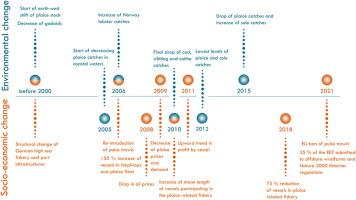Exploring the adaptive capacity of a fisheries social-ecological system to global change
IF 4.8
2区 环境科学与生态学
Q1 OCEANOGRAPHY
引用次数: 0
Abstract
Global change challenges coupled natural-human systems such as fisheries social-ecological systems (SES) because they are confined by spatial and functional ecosystem boundaries. Understanding the capacity of an SES to adapt to changing environmental or socio-economic conditions is complex and entails an analysis of the system's properties such as resilience, resistance, vulnerability, and adaptive capacity. We used a modified Ostrom framework to structure our analyses and to define the SES components, attributes and indicators of the German mixed demersal fishery SES operating in the southern North Sea. Combining analyses of 20-year time series of environmental and socio-economic data with network analysis and semi-structured interviews allowed for a detailed description of past SES adaptations. Hence, our analysis revealed autonomous adaptations of the SES to environmental and socio-economic change, which entailed a shift in target species, fishing strategies as well as a distinct decrease in number of actors. We found that the adaptive capacity of the SES has declined over time, and that the SES is now on the brink of being unable to withstand future environmental and socio-economic change. It is therefore captured in an undesirable state, reflecting a social-ecological trap where social and environmental feedbacks negatively reinforce each other. The main barriers to the adaptive capacity of the SES are related to fishing cultures, economic structures, policy frameworks and increasing conflicts over the use of marine space. An in-depth understanding of the linkages between the identified key SES components and related indicators is a prerequisite for developing future management approaches to enhance the adaptive capacity of SES to global change. Our findings highlight the need for tailored and context-specific co-management approaches for all decision-making processes affecting SES.

探索渔业社会生态系统对全球变化的适应能力
全球变化对渔业社会生态系统(SES)等自然-人类耦合系统提出了挑战,因为它们受到空间和功能生态系统边界的限制。要了解一个社会生态系统适应环境或社会经济条件变化的能力非常复杂,需要分析该系统的特性,如恢复力、抵抗力、脆弱性和适应能力。我们使用修改后的奥斯特罗姆框架来构建我们的分析,并定义在北海南部作业的德国底层混合渔业 SES 的 SES 组成部分、属性和指标。通过对 20 年时间序列的环境和社会经济数据进行分析,并结合网络分析和半结构式访谈,可以详细描述过去的 SES 适应情况。因此,我们的分析揭示了 SES 对环境和社会经济变化的自主适应,其中包括目标物种、捕捞策略的转变以及参与者数量的明显减少。我们发现,随着时间的推移,生态系统服务补偿的适应能力有所下降,目前已濒临无法承受未来环境和社会经济变化的边缘。因此,它处于一种不理想的状态,反映了社会和环境反馈相互负强化的社会生态陷阱。影响生态系统服务补偿适应能力的主要障碍与渔业文化、经济结构、政策框架和日益加剧的海洋空间利用冲突有关。深入了解已确定的可持续海洋环境的关键组成部分和相关指标之间的联系,是制定未来管理方法以提高可持续海洋环境对全球变化的适应能力的先决条件。我们的研究结果突出表明,在影响生态系统服务补偿的所有决策过程中,都需要采取量身定制、因地制宜的共同管理方法。
本文章由计算机程序翻译,如有差异,请以英文原文为准。
求助全文
约1分钟内获得全文
求助全文
来源期刊

Ocean & Coastal Management
环境科学-海洋学
CiteScore
8.50
自引率
15.20%
发文量
321
审稿时长
60 days
期刊介绍:
Ocean & Coastal Management is the leading international journal dedicated to the study of all aspects of ocean and coastal management from the global to local levels.
We publish rigorously peer-reviewed manuscripts from all disciplines, and inter-/trans-disciplinary and co-designed research, but all submissions must make clear the relevance to management and/or governance issues relevant to the sustainable development and conservation of oceans and coasts.
Comparative studies (from sub-national to trans-national cases, and other management / policy arenas) are encouraged, as are studies that critically assess current management practices and governance approaches. Submissions involving robust analysis, development of theory, and improvement of management practice are especially welcome.
 求助内容:
求助内容: 应助结果提醒方式:
应助结果提醒方式:


